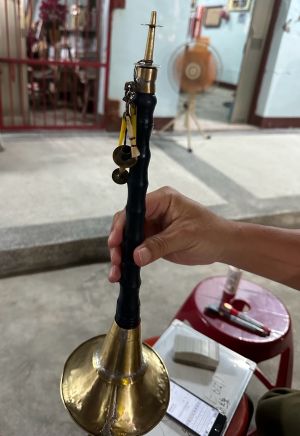Introducing New Staff Vol.86 : Minori TAI
2025/10/02
Mourning the Dead through Musictives
TAI, Minori
(Project Research Associate, October 2025)

My motivation to study funeral music began with my grandfather’s funeral. Quite suddenly, my grandmother asked me to play the clarinet at the farewell ceremony. I remember being surprised and bewildered by her request. Performing at a funeral was a very unusual experience, and it made me realize that music has the power to bring people together in remembrance of the deceased and to accompany them on their final journey. As an undergraduate, I majored in clarinet performance. I had practiced extensively and performed in concerts where artistry and technical perfection were expected, often in a competitive atmosphere. Yet playing at a funeral was profoundly different: it created an emotionally charged experience for those present and carried a depth of meaning I had never encountered in my earlier performances.
Music can add color to everyday life, and at times it generates moments of ecstasy. On the other hand, it does not feed us, earn income, or directly improve daily convenience. In moments of crisis such as earthquakes, musicians sometimes ask themselves, “What use is music?” As someone who has continued playing despite such doubts, discovering that music could serve a role in mourning—by helping both the deceased and the bereaved—was a striking and gratifying revelation.
Retraining on the keyboard and undergoing professional training to become a ceremony player (a funeral specialist musician) overturned much of what I had taken for granted in music. The aim was not to produce technically flawless performances, but to select and play music appropriate for the deceased, and to reflect the wishes of the bereaved. In funerals, it is not virtuosic repertoire that matters most, but rather the ability to play an enka, a popular song, or a piece filled with memories—even if requested on the spot.
The use of music in funerals is not limited to contemporary times. While the incorporation of popular songs and background music in Japan and the West is a modern phenomenon, ethnographies from around the world reveal many cases in which music has long been considered indispensable for sending off the dead. Sounds themselves are sometimes believed to carry the deceased to the afterlife, funeral chants may describe the journey to the other world, and music may be used to control the soul of the dead. In many regions of the world—including, but not limited to, Asia—lament songs are performed, expressing grief, sharing it collectively, and providing a socially meaningful outlet for emotions.
To further explore these diverse roles of music in funerals, I have begun research on Taiwanese funerals. In Hakka communities, for instance, traditional music played on the suona (a double-reed instrument) is considered essential for communication with the dead and ancestors. At the same time, pop songs or instrumental background music are also performed, shaping the atmosphere of the ceremony. Through such comparative study, I aim to deepen understanding of both the cross-cultural continuities and the contemporary transformations of music in mourning.